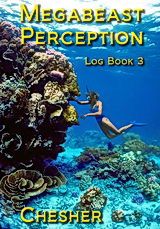|
|
Yachtus Yachtus
"I'm going windsurfing." I slide the board over the side and set up the sail. We got the board from Michel, in Noumea, just before we left. I'm getting the hang of it now and am able to sail along pretty good. It's good exercise. I pull up the sail and grab the wishbone boom. The wind catches me and off I go, pulling to windward, passing between Lion Heart and Wasathangi, headed for the outer part of Musket Cove.
There is a mental trick to windsurfing. Beyond the basics, you really can't explain how to use a windsurfer any more than you can explain how to ride a bicycle. The trick is to get out of the conscious area of the brain and into the muscles. What I do is pretend I'm a sea gull, gliding on the air currents. The sail is my wing. I am the muscles of the bird, totally unaware of cerebral sorts of things, just automatically responding to small changes in wind shifts, keeping the tension and angle of the sail just right to maintain my flight.
I skim past the edge of the coral garden hole and glance at the big yellow coral head. To the left of the coral head I have set up a camera mount on the bottom. It has two registration pegs held in place by cement. My underwater camera case plugs into the registration pegs so the camera points exactly at the tip of a growing branch of Acropora coral. I take two shots a day. One in the morning, one at night.
I tack and head off to Plantation Resort. I need to build some more camera mounts in other areas. Here, outside the protective inner reefs, there are small waves and the windsurfer board bounces over them. I flex my knees and lean back, taking my weight on my arms, my hands feeling the wind alive and thrusting in the sail. Waves are important in This Magic Sea. Also great photographic material.
Maybe I can do a sequence of shots with a windsurfer skimming over the waves, leaving a trail of red dye behind. I time the shots so the camera clicks just when the windsurfer is on the crest of a wave. If I get the timing right, the `movie' should show the windsurfer progressing on a path over a sea where the waves move up and down, not `along'. The dye will also stay in place as the water does not move with the waves. Or maybe it will move in another direction entirely depending on tidal currents. So we see three types of relative movement in This Magic Sea: the consciously directed movement of mind through the wind, the energy of the wind-sea interface in the pulsing waves, the tidal movement of water currents.
Vacationers crowd the beach, loafing in the sun. I manage a shaky tack right in front of them and head down wind, back towards all the yachts. The lagoon is blue, the water clear, the sky rimmed with white sand and palms. What a place to hang out. The wind gusts and I lay back, feeling the sail dancing in the air. Zowweeeeeee! I am moving.
Jesus Christ! That son of a bitch just threw his trash over the side! My board squishes through a mass of cans, bottles and plastic sacs and I hurl every cuss word I can think of back aboard the stupid yacht. He shouts something and I consider coming about, ramming into his boat and rearranging his face. But that sort of thing isn't good for the psyche. In fact, just thinking about it is not good and my creative juices are boiling with rage when I get back aboard Moira. Half the people on the other yachts are all out on deck wondering what the screaming was.
"What was that all about?" Freddy asks.
I growl and jump below and grab the microphone for the VHF radio. Everybody listens on Channel 72 so I flip to high power. I key the microphone switch. As long as I hold it down, nobody else can say anything. As calmly as I can I call, "Ahoy New Zealand Yacht Argus, Please be advised there are facilities ashore to dispose of your trash. There is no cost for the use of these facilities. When you throw your trash in the water it floats up on the beaches and on the reefs. This is a resort area. Your trash on the beaches is highly offensive to the people who use them and gets the resort owners very upset. Who do you think they get upset with? Why, they get upset with all the yachts. If they knew the trash was coming from just one asshole like you there would be no big problem. But they think it comes from all the yachts and soon the yachts are not welcome anymore.
"Therefore it would be an excellent idea if you were to make a real effort to take your lazy ass ashore and place your trash where it belongs in the proper receptacles. If this is beyond the feeble powers of your intellect I personally will gather up every piece of trash and garbage I can find ashore and on the reef and deposit it down your hatch. And if you make any effort to prevent me I'll shove it down your throat. I also advise any other yachts who are listening to help out, as Argus would make a wonderful garbage can or possibly a latrine since you are already so obviously full of shit."
There is a burst of radio noise: a mixture of cheers and screams of rage. I turn off the radio and go on deck to fold my windsurfer wing.
Eric and Susan Hiscock come rowing by in their dinghy. They are both in their seventies and have been cruising for some 30 years. Eric is a well known yachting author and is now almost blind. He smiles at me through thick glasses. "I say, that was a bit of good housekeeping."
"Uh, well, sorry if the language was a bit strong." I'm going through withdrawal from adrenaline symptoms.
"Oh no, sometimes strong language is the only kind which gets heard. You're dead right, too. When we first came here nine years ago there was only one other yacht here." He waves around the cove. There are about 20 boats anchored here. "Of course, the increase in numbers is due largely to the proliferation of voyaging yachts, but also because word has got around that Dick likes yachts and is kind and generous to their people. This could change quickly if too many yachts like Argus abuse the relationship. Fortunately, those sorts are a rare breed."
"Why don't you come aboard?" Freddy asks.
"Oh, no, not just now. We've got to go to the store." Susan replies. She paddles off, Eric sitting in the back grinning.
Today is Feast Day at Dick's Place. Freddy and I, like most of the other yachts, go in to join in the ritual consuming of a big pig roasted over hot rocks in an earth oven. Eric and Susan are there and we join them at their table.
"Eric, you gave me an idea, today, when you said Argus is a rare breed of Yacht. Most people think of a yacht as a conveyance: like a floating Camper Van. But really it is not like that at all."
"Yes, I suppose you are right. But how would you think of a yacht?" Eric smiles.
"Down in the high latitudes, in the Antarctic Sea, there is a little creature called the paper nautilus. Maybe you've seen one. It is shaped like the chambered nautilus but has a pure white shell decorated with little knobs."
"Oh yes, of course," Susan answers.
"Well, the paper nautilus is really quite different than a regular nautilus. A female octopus secretes the shell as a floating egg nest. She moves into it with a smaller male octopus and they float off together. The thin white shell is thus a product of the behavior of the octopus couple, made of their dreams and physical effort and innate knowledge."
"Oh yes, I see, and so are many yachts," Susan laughs.
"Right. A yacht is also built by a creature's dreams, physical effort and innate knowledge. A yacht is a living organism, just like the paper nautilus. A pelagic sea creature, roaming the oceans. The hominids inside are part of the whole living dream-shell. They are the conscious part deciding where the yacht will go. A yacht is not an inanimate thing. Indeed, if the hominids don't maintain the yacht it ages, deteriorates and dies."
"Rather quickly, too," Eric notes, his eyes enormous behind the thick lenses.
"When a yacht is in port, the hominids are like tentacles reaching out from the organism to feel around the shore, gathering food and drink and fuel and bits and pieces needed for survival. They bring these back into the hatch-like mouth of the yacht and store them in special fatty tissues called lockers and cabinets."
"I do hope you'll spare us the details of the kidneys and bowels," Eric swirls his drink.
"I have decided to give these sea creatures a formal scientific name, Yachtus yachtus. They are kind of like big sea birds. They have dacron wings to propel them over the sea. Dick's place is one of the major Pacific rookeries for Yachtus yachtus."
"This is delightful," Susan leans forward, "Tahiti and Vava'u, Tonga are also rookeries."
"Yes, they are. There is more than one species of the genus Yachtus. There is a lot of morphological variation within each species so the only way to identify the different varieties is by their behavior." I notice a few other yachties have stopped talking at the next table and are also listening in. I decide to speak a little louder so they can hear better."
"What are the species, then?" Eric asks.
"Well, Yachtus yachtus undergoes one or two migrations per year, has no fixed address, no serious preference for destination until a few days before departure and the hominids are always seen busily engaged in one project or another. It is actually a fairly rare bird.
"Other species are roughly divided into two broad groups: those never appearing in foreign rookeries and those appearing briefly. The species that do appear in remote rookeries are tethered to a fixed time schedule and can be identified by the lamenting song, 'gotta get back.'
"Of this second group, Yachtus squatus is trans-national but finds rookeries where they can work and stays put permanently or until forced to move on by circumstances. Their boats tend to be a bit dilapidated and the bottom fouled with barnacles and tube worms.
"Yachtus compeditorus is an elegant bird. It travels on yearly migrations in huge flocks. They rarely remain in any one foreign rookery for more than a few days and sail as quickly as possible from one rookery to the next. The first bird to arrive in the rookery first gets a special glittering reward.
"Yachtus collectivus travels alone or with a few other yachts. They stays at a rookery for a few days or weeks depending on the nature of their problems. They are easily identified by the constant bickering between the hominids as Yachtus collectivus is a joint ownership beast. There are several varieties: expenseaccountis, charterensis, and hippicommuneacus.
"Yachtus imaginaris is the most common species of the genus Yachtus. They are only found in their home rookery and seldom, if ever, venture more than a few days away from the dock, and then mostly on weekends and vacations. There are many varieties of Yachtus imaginaris, including fablensis, terrifiedencis, seasickacus and comemyretirementatoris.
"Yachtus imaginaris ephemeralis appears in foreign ports briefly and hurries home again. The hominids aboard are often unhappy with the realities of sailing after years of romantic dreaming. They can often be identified by scowling, worried faces and a wide variety of mechanical problems they can't solve.
"Yachtus terrestrialis is easily identified because the yacht is always being constructed and is often never even launched. They live entirely ashore, in backyards, old farm yards, industrial lots, and so on.
"And finally, there is the dreaded Yachtus vulgaris! There are three varieties of vulgaris, Binocularensis is identifiable by the lack of tan around the eyes caused by constant surveillance through binoculars of what other people are doing on other boats. Yachtus vulgaris regurgitatus is easily identified by the constant dribble of beer bottles, plastic bags, and other trash drifting astern. Yachtus vulgaris aristocratus has a loud song declaring its arrival in a foreign port as a momentous event of unparalleled valor and heroism. Natives are expected to fall all over themselves welcoming aristocratus."
By the time I am done we have collected a fair crowd of attentive yachtsmen, waiting, I guess, for their descriptions to come up. In the crowd I see the mattress faced captain of Argus. He walks off when I get to Yachtus vulgaris regurgitatus. This was the wrong thing to do as everyone toasts his huffy departure from the bar with hearty guffaws and even a few applause.



